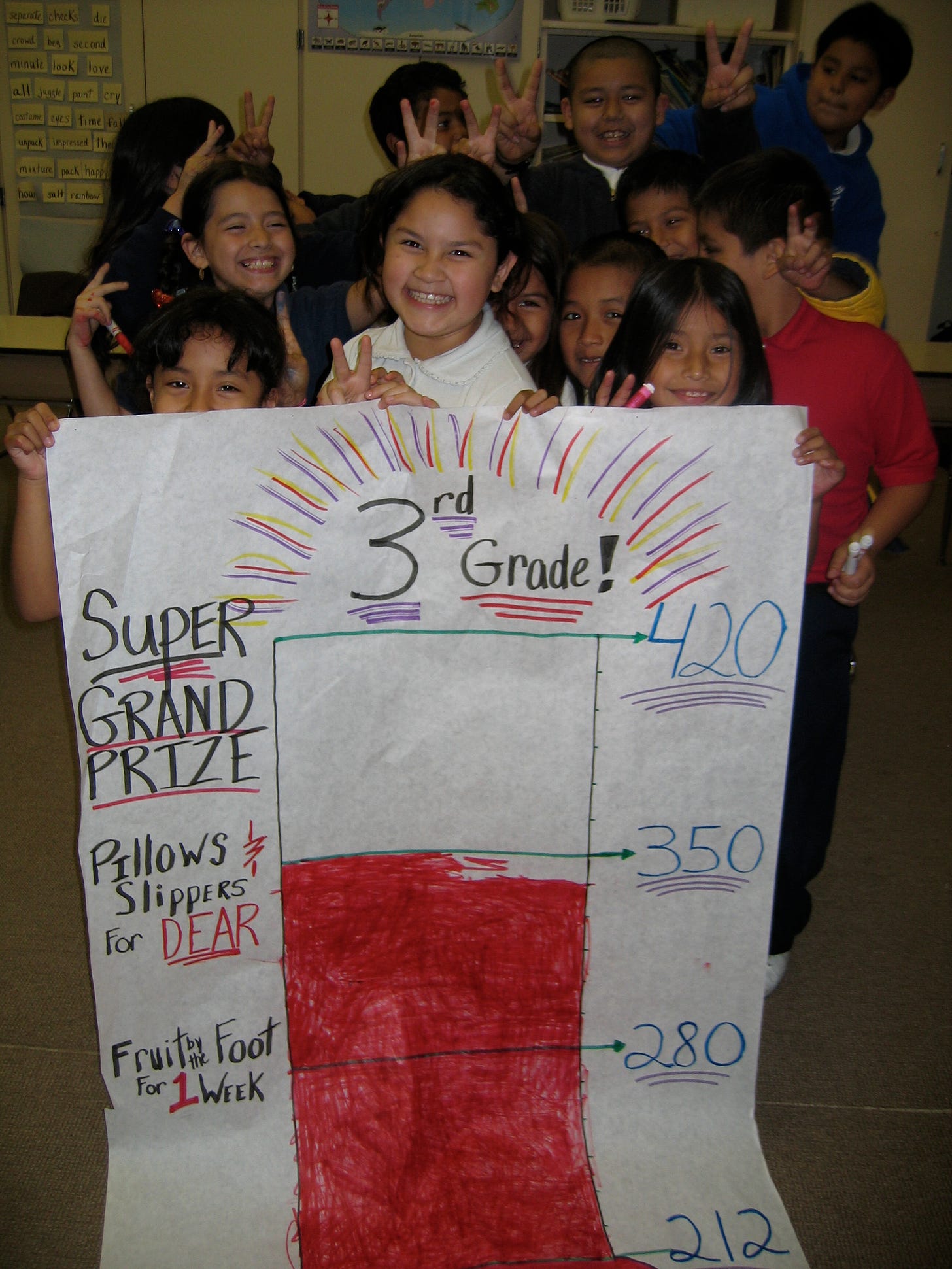What can New Year's Resolutions teach us about The Achievement Plateau?
A lot, probably.
We should focus less on outcomes and more on implementation.
As a first-year, 2nd-grade teacher, my Teach for America (TFA) coach made me create a Big Hairy Audacious Goal with my class. That’s the photo below. It was a big, juicy (and hairy?) outcome goal: the students’ collective, end of year DRA (Developmental Reading Assessment) levels all added together. I taught in a bilingual classroom, so it was actually the Evaluación del Desarolla de la Lectura, the Spanish-language version of the DRA. Regardless, if we hit that number, my students would have achieved the pinnacle of 2nd grade education. I guess. Note: purely coincidental the number was 420.
The theory TFA based this approach on was that big goals kept us focused and lead to great achievement. We had sessions on SMART goals, had our goals workshopped and approved by our coaches, and were encouraged to have a goal-launching party with our students to build investment. All this was supposed to help my students get better at reading. Except it didn’t.
As a first-year teacher almost 17 years ago, I had no idea how to teach reading. I didn’t know much about the importance of foundational skills like phonics and phonemic awareness, couldn’t lead an effective shared reading, and knew even less about how to teach writing.
We might think that setting big, hairy audacious goals might lead us to diligently research all those practices and then translate them to classroom practice, but, for me at least, it didn’t. Instead I stressed about hitting it, got angry when my students underperformed, and stayed in neutral. Maybe I was just a complete failure, and I suspect I might not be the only one whom big outcome goals have failed.
In education, we often focus heavily on outcome goals: a 10% increase in state test scores, a 20% reduction in the number of students scoring at the lowest level, all students score proficient on the end-of-course exam, etc.
A better practice might be focusing on the actions we know lead to better outcomes — implementation goals — while also paying less attention to the outcomes themselves.
Take writing, for instance. I know I want to get this newsletter off the ground this year. And I’m resisting the urge to create an New Year’s Resolution outcome goal like, “Get 3000 subscribers.” There are a lot of factors beyond my control that will influence that goal.
Instead, I’m taking some advice from Jerry Seinfeld and I’m focusing on writing for 30 minutes, three times each week, and publishing at least one newsletter each week. That’s an implementation goal I have a lot of control over. I’ll still take note of the outcome — maybe I’ll check the subscriber count quarterly — and the absence of a particular number is freeing. And I certainly need less to be stressed about.
I follow a similar approach for exercise and weight management. I focus less on a specific outcome, like a 5K time or a number on the scale, and more on the work I know can get me there: running for 45 minutes a few times each week and meal-prepping on Sunday.
If I had applied that strategy to my 2nd grade classroom, I might have focused on leading a shared reading every day and teaching 30 minutes of phonics daily. My execution would’ve been novice as a first-year teacher, but I could’ve built on those good habits in future years while knowing I was doing something to better my students’ reading skills.
At a larger scale, implementation goals might look like aiming for all teachers to hold community circle meetings each week, striving for 20 minutes of a class discussion each day, or bringing principals and academics department staff together for quarterly meetings. In each case, we might have an outcome in mind — improved school culture, improved student talk, and improved alignment within a district — while alleviating the burden and related stress of an outcome goal.
We’ve been focusing on outcomes in education for a long time with little success and a lot of over-stressed and demoralized educators. Maybe it’s time we de-emphasized outcomes and emphasized goals around the actual work that needs to be done.

